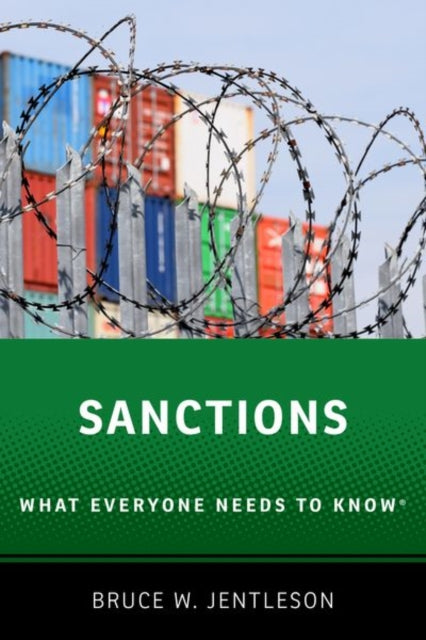Bruce W.Jentleson
Sanctions: What Everyone Needs to Know (R)
Sanctions: What Everyone Needs to Know (R)
YOU SAVE £15.73
- Condition: Brand new
- UK Delivery times: Usually arrives within 2 - 3 working days
- UK Shipping: Fee starts at £2.39. Subject to product weight & dimension
Bulk ordering. Want 15 or more copies? Get a personalised quote and bigger discounts. Learn more about bulk orders.
Couldn't load pickup availability
- More about Sanctions: What Everyone Needs to Know (R)
Economic sanctions are used by countries to punish each other and are a major phenomenon in world politics. Bruce Jentleson's book "Sanctions: What Everyone Needs to Know®" provides an overview of why they are used, their varieties, and the key factors affecting their success. He demonstrates that examining sanctions is key to understanding international relations and that they will likely continue to bear on global politics.
Format: Hardback
Length: 256 pages
Publication date: 08 December 2022
Publisher: Oxford University Press Inc
Economic sanctions are a significant and complex phenomenon in world politics, with one country imposing penalties on another as a form of punishment or retaliation. These sanctions can take various forms, including asset freezes, trade restrictions, and travel bans, and are often used to exert pressure on countries to comply with specific political or economic demands.
The use of economic sanctions has become increasingly prevalent in recent years, with major powers such as the United States, Russia, China, Japan, South Korea, Saudi Arabia, Qatar, France, Germany, and Norway all employing them as tools in their international relations. These sanctions are often used in response to conflicts, human rights abuses, or violations of international law, and can have far-reaching consequences for both the sanctioned country and the global economy.
One of the key questions surrounding economic sanctions is why they are used so frequently. Some argue that sanctions are a necessary tool for maintaining international order and promoting peace and security. They can be used to pressure countries into changing their behavior or to prevent the spread of weapons of mass destruction or other threats to global stability.
However, others argue that sanctions are often ineffective and can have unintended consequences. They can hurt the people of the sanctioned country, particularly those who are not responsible for the actions of their government. Sanctions can also lead to economic instability, inflation, and poverty, which can exacerbate social and political tensions.
There are various types of economic sanctions, each with its own characteristics and implications. Some of the most common types include asset freezes, trade restrictions, and travel bans. Asset freezes prevent individuals or entities from accessing or disposing of their assets, while trade restrictions limit the amount of goods that can be imported or exported from a country. Travel bans prevent individuals from entering or leaving a country, which can be particularly effective in isolating a country from the global economy.
Another important factor affecting the success of economic sanctions is the level of international cooperation. Sanctions require the cooperation of multiple countries, and any country that refuses to comply with the sanctions can undermine their effectiveness. This is particularly true in cases where the sanctioned country is a major economic power, such as China or Russia.
Despite these challenges, economic sanctions are likely to continue to play a significant role in global politics in the years to come. As tensions between countries continue to escalate and conflicts persist, it is likely that we will see more and more countries employing sanctions as a tool in their international relations.
In conclusion, economic sanctions are a complex and important phenomenon in world politics, with one country imposing penalties on another as a form of punishment or retaliation. While they can be used to promote peace and security, they can also have unintended consequences and hurt the people of the sanctioned country. The success of economic sanctions depends on the level of international cooperation and the specific circumstances surrounding each case. As tensions between countries continue to escalate, it is important to consider the potential impact of economic sanctions on global stability and to work towards finding alternative solutions to conflicts.
Weight: 428g
Dimension: 143 x 218 x 21 (mm)
ISBN-13: 9780197530313
This item can be found in:
UK and International shipping information
UK and International shipping information
UK Delivery and returns information:
- Delivery within 2 - 3 days when ordering in the UK.
- Shipping fee for UK customers from £2.39. Fully tracked shipping service available.
- Returns policy: Return within 30 days of receipt for full refund.
International deliveries:
Shulph Ink now ships to Australia, Belgium, Canada, France, Germany, Ireland, Italy, India, Luxembourg Saudi Arabia, Singapore, Spain, Netherlands, New Zealand, United Arab Emirates, United States of America.
- Delivery times: within 5 - 10 days for international orders.
- Shipping fee: charges vary for overseas orders. Only tracked services are available for most international orders. Some countries have untracked shipping options.
- Customs charges: If ordering to addresses outside the United Kingdom, you may or may not incur additional customs and duties fees during local delivery.


